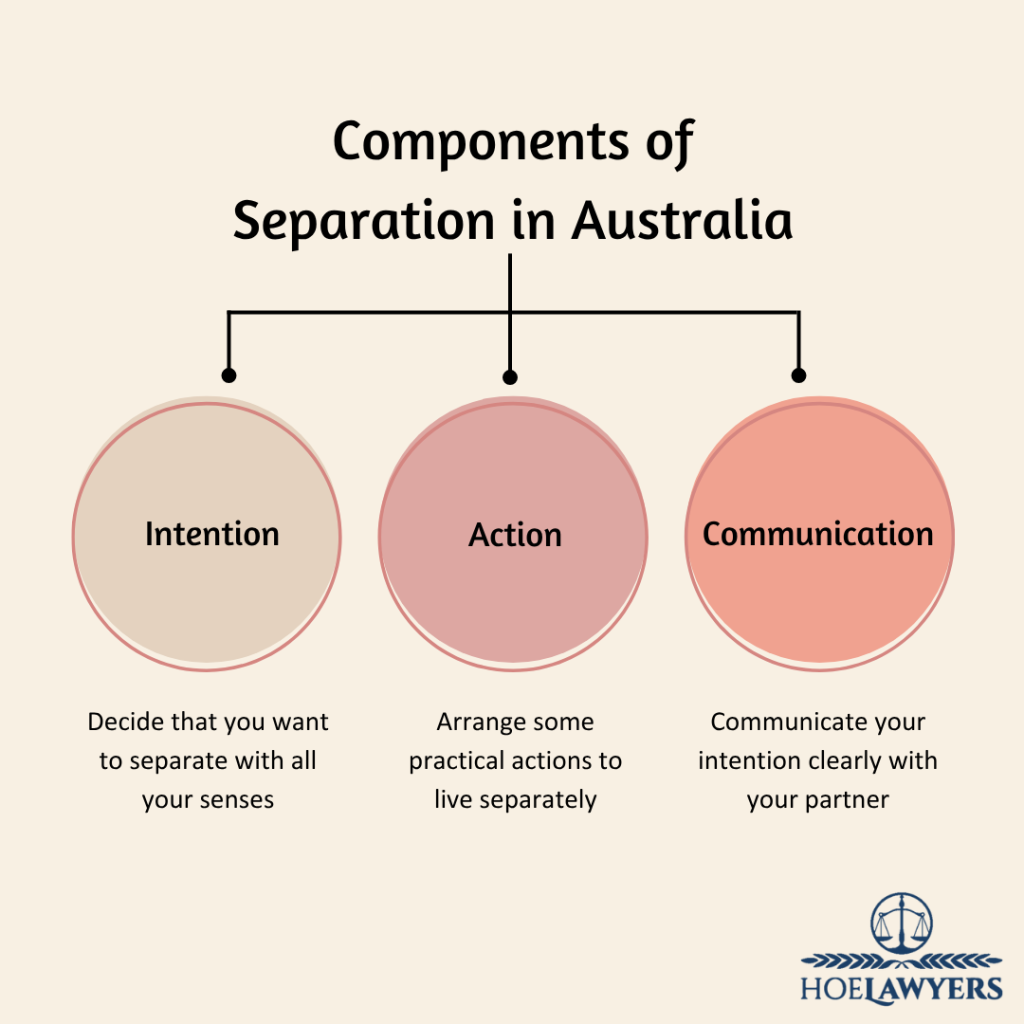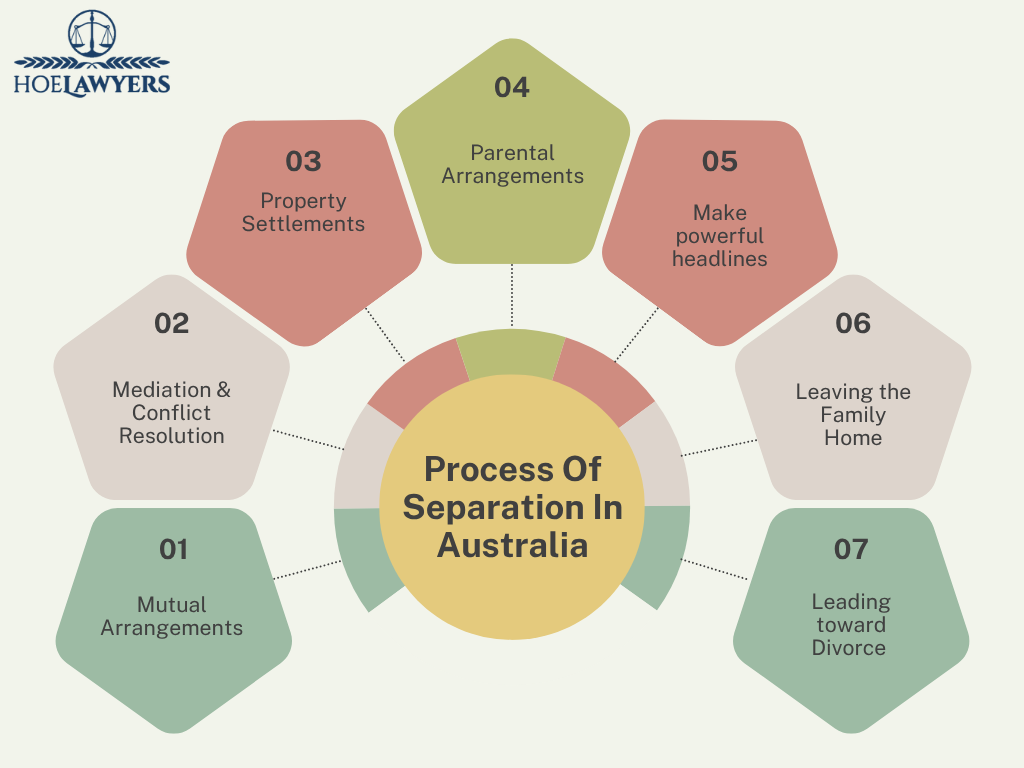
When a relationship begins to break down, the situation is everything but not “easy”. The emotional weight of making the decision is already enough burden, and legal complexities add a whole other layer.
Clients reach out to us in a confused state as they don’t even know, what is the legal meaning of separation in Australia? What are the steps to be taken? And how to settle everything with your partner once & for all?
At Hoe Lawyers, we’ve witnessed the situation countless times. We’ve seen tears, resilience, fear, and strength, all in the same room. Our trusted separation and divorce lawyers in Perth can help you move from pain to power, & from confusion to clarity.
Because you deserve to reclaim your future by knowing your rights, options, and the road ahead. Let’s explain the separation law in Australia to you in simple & plain words.
Meaning of Separation in Australia: How it is Defined?
In Australia, separation means a relationship has broken down, and at least one partner has expressed that there’s no reasonable chance of getting back together.
Family Law Act 1975 sets the foundation of process and also of what follows i.e. divorce. According to section 49 of this law:
The separation meaning is completed when you and your partner stop living as a couple. It can happen without any formal document, court order or mutual agreement. But you need to communicate the decision to your partner & sort out the essentials.
What’s the Definition for Separation When You Are Living Under Same Roof?
Did you know? You don’t have to move out to be considered separated. According to Australian law of separation, you can be separated and still live under one roof.
It means you are live in the same home but no longer act as a couple, means:
- No sexual activity
- Sleeping in separate rooms
- No sharing of meals or domestic duties
- Managing separate finances
You’ll need evidence of one or more above mentioned steps to prove separation when you apply for divorce. E.g. affidavits from friends or family.
Types Of Separation in Australia
According to the separation definition under the Family Law Act 1975,the following types are acceptable.
(i). Informal Separation
You and your partner agree to go your separate ways without involving the courts. You sort out who stays in the house, where the kids will live, and how to manage money. The arrangements aren’t legally binding, means they can be changed or disputed later.
(ii). Legal Separation
This is a formal option, also called a separation agreement. Legal separation Australia involves putting your arrangement in writing and making it legally enforceable. You stay legally married, but live apart with a clear, court-recognised arrangements.
Legal separation provides formal security around your rights and responsibilities. Plus, it makes the divorce process easier.
Components Defining Legal Meaning of Separation
Three components are necessary to finalise the separation in Australia.
(i). Intention
The intention to end the relationship must be genuine and clear. Though it doesn’t have to be mutual. If only one partner decides to separate, decision is still valid under Australian law.
(ii). Action
There must be some physical or practical change that reflects the end of the relationship. Like sleeping separately, not attending social events together, or ceasing shared activities.
(iii). Communication
One party must communicate the decision to separate. It can be verbal or in writing, and should be clear and direct. Communication is vital for the process to move ahead.

Once these three boxes are ticked, you need to move toward important handlings.
Separation Checklist: Important Things to Handle
Ending a relationship put strain on your nerves but you can’t ignore the practical issues. Some aspects you need to tackle are:
- Make the arrangements for the kids, like where they’ll live & who’ll care for them.
- Work out how you’ll both manage the property assets & move financially forward.
- Agree on who’s paying the rent, mortgage, or any shared debts.
- Make a clear decision on who’ll remain in the family home.
- Update government agencies & superannuation beneficiaries like Centrelink, Medicare & Child Support of your separation.
- Notify your insurance companies & super fund about the change in your relationship & sort out joint bank, building society or credit union accounts.
- Inform friends and family too. It’ll help emotionally and will be required for further proceedings.
These timely steps will smooth out the process & avoid headaches down the track.
Separation Process Australia: What Are the Steps?
If we make a proper pathway of the process, it will involve the following steps.
Also Read: Marriage Separation Process in Australia
(i). Mutual Agreements
Before going to court, couples are encouraged to communicate clearly on the matter. They should decide all important handlings mutually, if possible.
(ii). Mediation and Dispute Resolution
In case of any disagreements, the couple should resolve it through mediation of Family Dispute Resolution (FDR). It is a legal requirement for parenting matters if there isn’t any risk of domestic violence.
(iii). Property Settlement
Once separated, both parties must work out on splitting assets and debts. It can be done through mutual consent or via court proceedings if an agreement isn’t possible. Australian law believes in a fair and just outcome for both parties. But fair doesn’t always mean equal.
So, what’s included in property settlement?
The term “property” covers more than just your home. It includes the division of all important assets like:
- Real estate
- Vehicles
- Superannuation
- Savings and investments
- Business interests
- Debts, mortgages, loans, or credit cards
Everything you both own (and owe) needs to be disclosed. Hiding assets can backfire and delay the process.
And, How is Property Divided?
There’s no fixed formula for it, the court (or mediators) look at:
- What each party contributed financially and non-financially (like being a stay-at-home parent or homemaker).
- Future needs like earning capacity, health, and who’ll care for children
Then a just and equitable division is decided. If you finalise the property settlement during the separation period, it’ll make divorce process easier & quicker.
(iv). Parenting Arrangements
When children are involved, parenting arrangements must be formalised before anything else. It involves the decisions like:
- Where the child will live
- How much time they’ll spend with each parent?
- How major decisions (like schooling or healthcare) will be made?
If there’s a mutual arrangement of these between you and your ex-partner, it’s the best-case scenario. Otherwise, the Family Court will step in and make a decision through a legally binding parenting order.
What are your rights around child custody in Australia?
Under the Family Law Act 1975 sub-division BA:
- Both parents have equal responsibility for their child’s upbringing even if the child mainly lives with one parent.
- Thechild’s best interests come first.The court will look at their emotional & physical needs, safety and preferences.
- Either one of the parents can apply for parenting orders.
- If the child lives with one parent full-time, the other parent still has a right to see and spend time with them regularly.
Remember it’s the child who gets the most affected by parent’s separation. So, handle this step carefully.
(v). Leaving the Family Home
Leaving your shared home is not a legal requirement, especially when children or financial constraints are involved.
But if tensions rise & safety is a concern, you can apply to the court for a sole use and occupation order. It’ll give one person the legal right to live in the home, and the other must move out. You can also apply for Domestic Violence Protection Order if you have any threat from partner.
Remember, if you move out (by choice or by court order), your ownership rights remain unchanged. You still legally own your share in home, even if you’re no longer living there.
(vi). Spousal Maintenance
Sometimes, after a separation, one partner can struggle financially while the other is more secure. In these cases, the less well-off spouse can be entitled to ongoing financial support paid by the other person. It all depends on:
- Your income and earning capacity
- Your age and health
- Whether you’re caring for children
Based on these factors, the court will order your partner for spousal maintenance, either as regular payments or a lump sum.
(vii). Leading Toward Divorce
Once you’ve been separated for at least 12 months, either you or your partner (or both) can apply for a divorce. As per the Marriage Act 1961 and Marriage Amendment Act 2017.
You’ll need to submit an application to the Federal Circuit and Family Court of Australia.
The process includes:
- Filing the application online
- Paying the fee
- Proving that the marriage has broken down permanently since a year
Once everything is in order, the court will review the application. And if satisfied, grant a divorce order, officially ending the marriage.
Read more details How to get a divorce in Western Australia

Separation Meaning for De Facto Couples
A de facto relationship,as defined by the Family Law Act 1975 Section 4AA, involves two adults (same-sex or opposite-sex) living together in a domestic partnership for at least two years, or who share a child.
The legal rights around separation of such couples are similar to married couples, especially property division and child custody. However, if your relationship is not registered, you’ll need to prove it was genuine and long-term before the court accepts your application.
But if you’re unsure, it’s best to get advice from a family lawyer who can look at your situation and guide you through the next steps.
The Role of Separation Lawyer in Legal Support
Getting legal help during the separation process protect your best interests & keep you informed of all the policies that apply.
A good family lawyer will:
- Handles all the paperwork from financial documents to parenting agreements
- Gives expert advice on what you’re entitled to
- Helps negotiate with your ex-partner
- Protects your rights around property, custody, and support
- Represent you in the court, and try for a fair outcome
Plus, acting as a neutral middle person, your lawyer can help keep communication respectful and focused, which is especially helpful when emotions are running high.
Searching for Separation Lawyers Near Me?
Contact Hoe Lawyers for Expert Guidance & Genuine Support
We speak your language, for a jargon-free guidance, in writing and over the phone. From parenting plans to property settlements, our separation lawyers will protect your interests and wellbeing at every stage.
Since 2009, Perth families have trusted us to handle everything from marriage separation to financial settlements, all underpinned by our motto:
“Better a little gain with righteousness than much gain with injustice.” (Proverbs 16:8)
